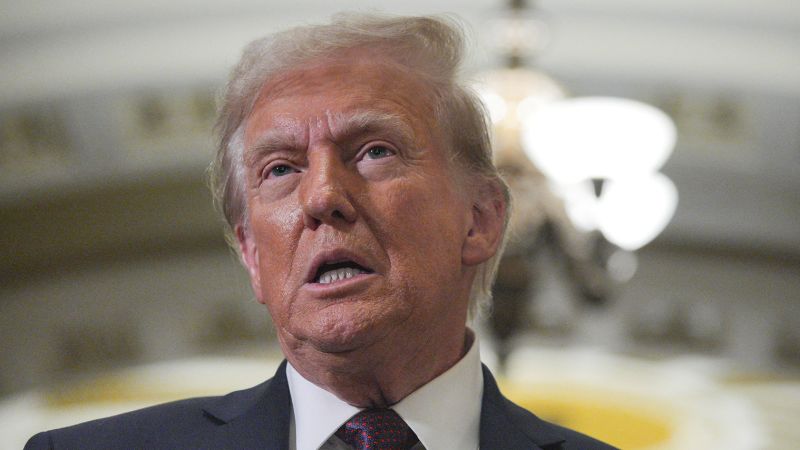 |
|
Special Counsel Jack Smith's report on Donald Trump's attempts to overturn the 2020 election has been released, detailing the former president's alleged criminal activities. The 130-page document, released after a court battle delayed its publication, unequivocally states that Trump engaged in criminal efforts to retain power following his electoral defeat. The report meticulously recounts Trump's actions, including pressuring state officials, promoting the fraudulent electors scheme, and pressuring Vice President Mike Pence. It also connects Trump's actions to the January 6th attack on the US Capitol, emphasizing the disruption of the peaceful transfer of power—a process Smith highlights as having functioned without interruption for over 130 years until Trump's interference.
Smith's report details the considered charges against Trump, including conspiracy to defraud the United States and obstruction of an official proceeding. Despite ultimately dropping the case following Trump's election victory and the Supreme Court's presidential immunity ruling, Smith vehemently rejects Trump's claim of exoneration. The report clarifies that the dismissal wasn't based on a lack of evidence or merit, but rather on the Department of Justice's interpretation of the Constitution which prohibits the prosecution of a sitting president. Smith’s team explicitly states that they believe the admissible evidence was sufficient for a conviction. The report also elaborates on why an insurrection charge was not pursued, citing a lack of relevant case law and the inherent litigation risks.
A significant portion of the report addresses potential defenses Trump might have raised in court. Smith refutes the idea that Trump acted in good faith, arguing instead that Trump knowingly made false claims of election fraud. The report also counters the potential argument that Trump was merely following the advice of his attorneys, asserting that those attorneys were themselves participants in the alleged criminal conduct. Furthermore, the report clarifies that Trump's actions, even those seemingly protected by free speech, were not shielded by the First Amendment due to the use of knowingly false statements to commit the alleged crimes. The report also discusses Trump’s attempts to intimidate and harass witnesses, primarily via social media posts, describing it as a fundamental component of his conduct.
Smith defends the unprecedented prosecution, highlighting the significant federal interest in protecting the integrity of the electoral process and the peaceful transfer of presidential power. He emphasizes the need for evenhanded administration of the law, noting the numerous individuals already charged for their roles in the January 6th attack, and contrasts this with Trump’s central role in instigating the events. The report explains that even if the Georgia election subversion case or a Senate impeachment conviction had occurred, these wouldn't have fully addressed the federal interests at stake. The investigation involved extensive witness interviews and a review of a vast amount of data, leading to the ultimate charges against Trump. The report concludes by reiterating the office's commitment to upholding the law and adhering to Justice Department policies regarding election-year sensitivities, directly countering Trump’s claims of election interference.
The report's release was preceded by a series of letters exchanged between Smith's team and Trump's lawyers. Trump's lawyers attempted to block the report's release, accusing Smith of perpetuating false accusations. Smith, in response, accused Trump's lawyers of making false and misleading claims and pointed out that they failed to provide specific factual objections to the report. The appendix reveals the combative nature of the exchanges, highlighting the continuing tension between Trump and the Justice Department. The report’s release also saw a continuing legal battle surrounding the second volume of Smith's report, which focuses on the classified documents investigation. Attorney General Merrick Garland decided against public release of this volume, but its release to a select group of lawmakers has been blocked by a court order.
In conclusion, Jack Smith's report provides a comprehensive account of Donald Trump's alleged efforts to overturn the 2020 election. While the criminal case against Trump was ultimately dropped due to legal technicalities and the timing of his re-election, the report makes clear the Special Counsel's conviction that Trump engaged in criminal actions and that he stood by the merits of his case. The report's detailed examination of the evidence and the legal justifications behind the prosecution serves as a substantial record of the investigation and its findings, regardless of the final outcome of the criminal proceedings. The ongoing legal battles surrounding the release of certain portions of the report further highlight the complexity and significance of the events surrounding the 2020 election and its aftermath.
Source: Special counsel report condemns Trump’s ‘criminal efforts to retain power’ in 2020
